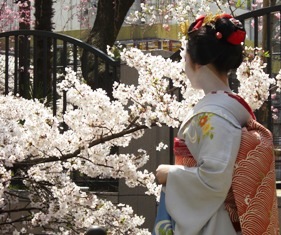JICA Volunteers in Palau
◆Alii from Palau!
Moeko Watanabe
JICA Volunteer
Angaur Elementary School
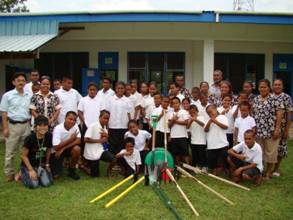
(Everyone from Angaur Elementary School)
“OKAERINASAI!” (Japanese word for “Welcome home!”)
Every time when I return to my island, the villagers welcome me with this word. This is my favorite moment.
June 19th, 2012 – this was the day I arrived in Palau for the first time in my life. Originally, I was supposed to be dispatched to Ngiwal Elementary School in Babeldaob but due to school consolidation, my assignment was changed. On August 1st, I arrived at my new work place, Angaur Elementary School.
The island of Angaur is about three and a half hours south from Koror on the regular state boat located in the open sea. On the island, there are about 150 residents, along with lively monkeys, chickens and dogs ruling the roads. The village looks like a scenery out of a fairy tale.
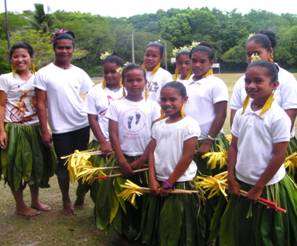
(Joining the Palauan dance team)
(far left is the author)
My school, Angaur Elementary School, is a small school with 30 students from grade 1 to grade 8 and 9 teaching staff. Each class only has 2 to 7 students.
My assignment is to improve the basic math skills of the students and to develop math teaching skills of the teachers. In order to accomplish these goals, for the first year of my assignment, I have joined the lower grades’ math classes as a support teacher, studied appropriate teaching materials with my Palauan colleagues, held math competition, and introduced calculation drill activities into class.
However, for this year, the school is lacking staff and I have been assigned as a home-room teacher for grade 3. As a result, I am teaching not only math, but also science, social studies, English, and even Palauan language! In the beginning, I was very nervous that me, a foreigner who have never spoken Palauan until recently, had to teach the language. But once I started, some of my kind colleagues visited my class to support me, and at other times I can ask the students questions on things that I am not sure about. It is a strange form of class but to study and learn with the children is a very enjoyable experience.
Besides studies, I am hosting “Japanese Club” activities once a week. Not only the language but also physical activities like Kibasen (a team sport mocking cavalry battle, with three people carrying one person on their shoulders and fighting to take the headband from the opponent team), Sumo, Darumasan-ga-koronda (children’s game similar to “red light, green light”) is very popular. It makes me feel proud that not just the elderly but also the children are very interested in Japan, Japanese culture and old Japanese games.
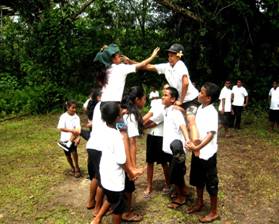
(Students playing Kibasen)
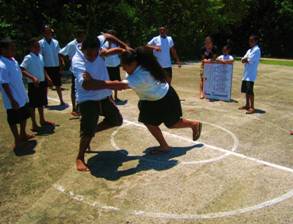
(Girsl are as strong as boys!)
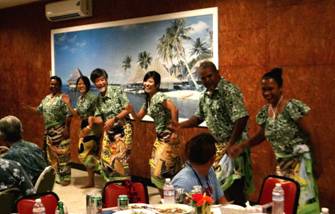
(Palauan Dancing with counterparts)
In Angaur, once the weather turns bad, power and water stops frequently and the regular state boats get cancelled so food and supplies won’t be delivered for a while. At times the local stores become completely empty! When I first started to live here, I used to worry about what to do when I run out of food or daily supplies such as tissue paper. But people have the ability to rack our brains out when there is nothing available. These days, I do not worry anymore; I just think of something to substitute the missing, or go into the forest to find food – I can act for my own survival now.
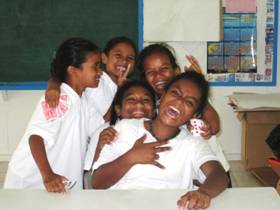
(Laughter gives me energy every day)
The more I understand the villagers’ lifestyle, I feel their vitality and realize how much they utilize the nature in their lives. They go out fishing at sea, catch crabs in the forest, get firewood from the woods, and bake coconut bread using local ovens. Then they send these products to Koror to sell once a week by the regular state boat and make their livings. I feel a strong sense of admiration and astonishment from their ways of living, producing various things out of what seems to be nothing at a first glance.
It has been a year and three months since my arrival to Angaur. Although I am still searching my way out, I must say that I am having a very fruitful experience here, supported by the kindness and toughness of the people of Angaur. I am extremely happy that I have another place I could call “home”.
Now let’s go back home! TADAIMA! (Japanese word for “I’m home!”)
©Embassy of Japan in the Republic of Palau
P.O. Box 6050 Koror, Republic of Palau 96940

